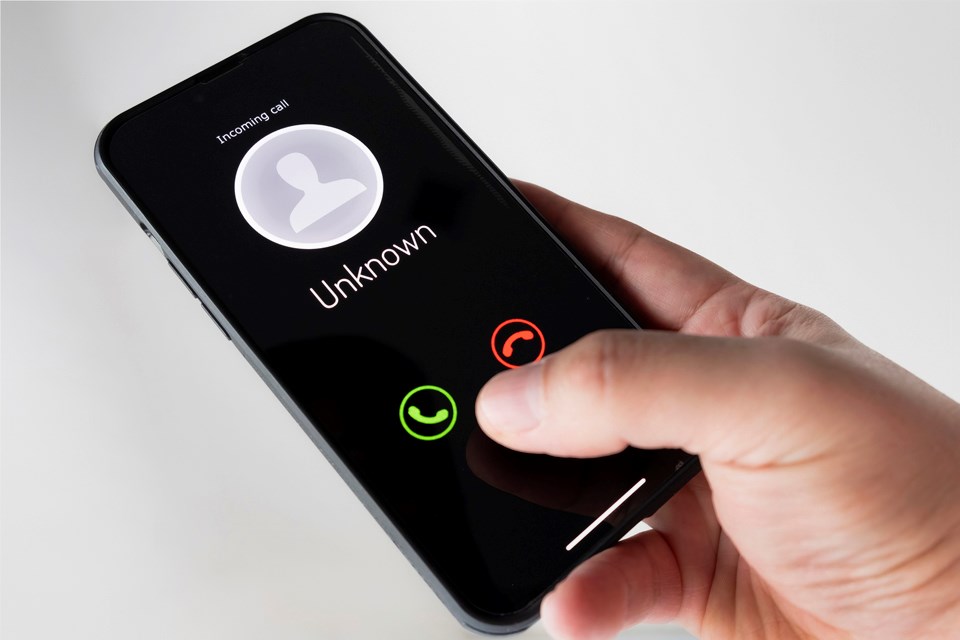If someone sent you a ransom demand saying they had kidnapped your child, you’d probably think a quick phone call or text to your son or daughter would be enough to expose the whole thing as a fraud.
But what if they were thousands of miles away and you couldn’t reach them?
“I can’t even imagine being in that position,” said Sgt. Freda Fong with Burnaby RCMP’s investigative support team.
But that’s just what happened to the family of an international student living in Burnaby in November.
The victim, a post-secondary student from China, was contacted in August by two people posing as Chinese police officers, according to police.
The fraudsters told him he was a suspect in a police investigation in China and, over the course of several weeks, pressured him into paying them tens of thousands of dollars, which they said were needed for legal fees in his court case.
They also tricked him into making a series of videos that made it appear as though he was being held hostage, according to Fong.
“They said ‘If you make a video that looks like this, we can say that it’s impossible for you to have been involved in that case,’” she said.
The scammers then used the video and other information in a “virtual kidnapping,” telling his parents in China they had kidnapped him, and demanding a large ransom.
The international student had been convinced to go into hiding, meaning his family couldn’t reach him to clear up the hoax.
“What we have seen in this type of crime is that simultaneously when the suspects are making the ransom demands, they’ll tell the victim to cut all contact with everyone,” said Fong. “In some cases, the victim will be told to hide in a hotel room; other times we’ve found them just in an open field or at a mall where they are not usually at, so that their family and friends can’t reach them.”
Fortunately, the international student’s family contacted police in Canada, and local Mounties were able to confirm his safety and expose the scheme.
Fong said so-called virtual kidnappings are less common than they were two or three years ago, but they seem to have cropped up again.
She said the recent Burnaby case, which remains under investigation, was unusual in that it lasted over a period of weeks.
“In this particular case, I know that the suspects were quite persistent, meaning they were calling and checking in almost every day or every other day,” she said.
Virtual kidnapping scams target Chinese nationals, according to police, and the perpetrators could be anywhere in the world.
“In this case, it appears to be random calling until whoever answers the phone will play along, if you will,” Fong said.
The fraudsters work to earn their victims’ trust by telling them the legal trouble they’re in is a case of mistaken identity that can be cleared up with photos, videos and, of course, money, according to Fong.
She said international students new to Canada are vulnerable to the scheme because they may be isolated and are unfamiliar with this country’s criminal justice system.
“When a person doesn’t have the proper social support network and they’re in isolation here, and, with the time difference, keeping in touch with family is hard, so it’s almost like, ‘Hey, here’s someone that’s now talking to me every day and is helping me.’ That can have an effect on a person when they feel like there’s nobody to reach out to,” Fong said.
Burnaby RCMP is now warning international students and other Chinese nationals new to the country to beware of the scam.
The detachment has reached out to local post-secondary institutions to get the word out and had information about the fraud translated into Chinese.
Fong urged international students to be aware of the warning signs and stay connected.
“Especially this time of year, if you’re an international student, stay connected with your family overseas,” she said.
What to do if you receive a call:
- Don't comply with the caller’s demands
- Hang up and report the incident to local police
- Never give out personal information over the phone
- Warn your loved ones about the "virtual kidnapping" fraud
Follow Cornelia Naylor on Twitter @CorNaylor
Email [email protected]




